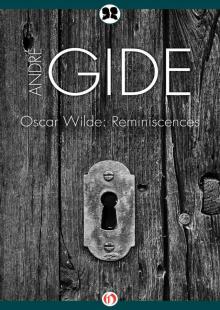- Home
- André Gide
The Counterfeiters: A Novel Page 10
The Counterfeiters: A Novel Read online
Page 10
Pauline went away with George and left me with Olivier.
“I trust him to your care,” she said, laughing; but Olivier seemed irritated and turned away his face.
He drew me out into the street. “I didn’t know you knew the Azaïses so well.”
He was very much surprised when I told him that I had boarded with them for two years.
“How could you do that rather than live independently—anywhere else?”
“It was convenient,” I answered vaguely, for I couldn’t say that at that time Laura was filling my thoughts and that I would have put up with the worst disagreeables for the pleasure of bearing them in her company.
“And weren’t you suffocated in such a hole?” Then, as I didn’t answer: “For that matter, I can’t think how I bear it myself—nor why in the world I am there.… But I’m only a half-boarder. Even that’s too much.”
I explained to him the friendship that had existed between his grandfather and the master of the “hole,” and that his mother’s choice was no doubt guided by that.
“Oh well,” he went on, “I have no points of comparison; I dare say all these cramming places are the same, and, most likely, from what people say, the others are worse. I shouldn’t have gone there at all if I hadn’t had to make up the time I lost when I was ill. And now, for a long time past, I have only gone there for the sake of Armand.”
Then I learnt that this young brother of Laura’s was his schoolfellow. I told Olivier that I hardly knew him.
“And yet he’s the most intelligent and the most interesting of the family.”
“That’s to say the one who interests you most.”
“No, no, I assure you, he’s very unusual. If you like we’ll go and see him in his room. I hope he won’t be afraid to speak before you.”
We had reached the pension.
The Vedel-Azaïses had substituted for the traditional wedding breakfast a less costly tea. Pastor Vedel’s reception room and study had been thrown open to the guests. Only a few intimate friends were allowed into the pastoress’s minute private sitting-room; but in order to prevent it from being overrun, the door between it and the reception room had been locked—which made Armand answer, when people asked him how they could get to his mother: “Through the chimney!”
The place was crowded and the heat suffocating. Except for a few “members of the teaching body,” colleagues of Douviers’, the society was exclusively Protestant. The odour of Puritanism is peculiar to itself. In a meeting of Catholics or Jews, when they let themselves go in each other’s company, the emanation is as strong, and perhaps even more stifling; but among Catholics you find a self-appreciation, and among Jews a self-depreciation, of which Protestants seems to me very rarely capable. If Jews’ noses are too long, Protestants’ are bunged up; no doubt of it. And I myself, all the time I was plunged in their atmosphere, didn’t perceive its peculiar quality—something ineffably alpine and paradisaical and foolish.
At one end of the room was a table set out as a buffet; Rachel, Laura’s elder sister, and Sarah, her younger, were serving the tea with a few of their young lady friends to help them.…
As soon as Laura saw me, she drew me into her father’s study, where a considerable number of people had already gathered. We took refuge in the embrasure of a window, and were able to talk without being overheard. In the days gone by, we had written our two names on the window frame.
“Come and see. They are still there,” she said. “I don’t think anybody has ever noticed them. How old were you then?”
Underneath our names we had written the date. I calculated:
“Twenty-eight.”
“And I was sixteen. Ten years ago.”
The moment was not very suitable for awakening these memories; I tried to turn the conversation, while she with a kind of uneasy insistence continually brought me back to it; then suddenly, as though she were afraid of growing emotional, she asked me if I remembered Strouvilhou?
Strouvilhou in those days was an independent boarder who was a great nuisance to her parents. He was supposed to be attending lectures, but when he was asked which ones, or what examinations he was studying for, he used to answer negligently:
“I vary.”
At first people pretended to take his insolences for jokes, in an attempt to make them appear less cutting, and he would himself accompany them by a loud laugh; but his laugh soon became more sarcastic, and his witticisms more aggressive, and I could never understand why or how the pastor could put up with such an individual as boarder, unless it were for financial reasons, or because he had a feeling that was half affection, half pity, for Strouvilhou, and perhaps a vague hope that he might end by persuading—I mean converting—him. I couldn’t understand either why Strouvilhou stayed on at the pension, when he might so easily have gone elsewhere; for he didn’t appear to have any sentimental reason, like me; perhaps it was because of the evident pleasure he took in his passages with the poor pastor, who defended himself badly and always got the worst of it.
“Do you remember one day when he asked Papa if he kept his coat on underneath his gown, when he preached?”
“Yes, indeed. He asked him so insinuatingly that your poor father was completely taken in. It was at table. I can remember it all as if …”
“And Papa ingenuously answered that his gown was rather thin and that he was afraid of catching cold without his coat.”
“And then Strouvilhou’s air of deep distress! And how he had to be pressed before he ended by saying, that of course it was of ‘very little importance,’ but that when your father gesticulated in preaching, the sleeves of his coat showed underneath his gown and that it had rather an unfortunate effect on some of the congregation.”
“And after that, poor Papa preached a whole sermon with his arms glued to his sides, so that none of his oratorical effects came off.”
“And the Sunday after that he came home with a bad cold, because he had taken his coat off. Oh! and the discussion about the barren fig-tree in the Gospel and about trees that don’t bear fruit.… ‘I’m not a fruit-tree. What I bear is shade. Monsieur le Pasteur, I cast you into the shade.’ ”
“He said that too at table.”
“Of course. He never appeared except at meals.”
“And he said it in such a spiteful way too. It was that that made grandfather turn him out. Do you remember how he suddenly rose to his feet, though he usually sat all the time with his nose in his plate, and pointed to the door with his outstretched arm, and shouted: ‘Leave the room!’ ”
“He looked enormous—terrifying; he was enraged. I really believe Strouvilhou was frightened.”
“He flung his napkin on to the table and disappeared. He went off without paying us; we never saw him again.”
“I wonder what has become of him.”
“Poor grandfather!” Laura went on rather sadly. “How I admired him that day! He’s very fond of you, you know. You ought to go up and pay him a little visit in his study. I am sure you would give him a great deal of pleasure.”
I write down the whole of this at once, as I know by experience how difficult it is to recall the tone of a dialogue after any interval. But from that moment I began to listen to Laura less attentively. I had just noticed—some way off, it is true—Olivier, whom I had lost sight of when Laura drew me into her father’s study. His eyes were shining and his face extraordinarily animated. I heard afterwards that Sarah had been amusing herself by making him drink six glasses of champagne, in succession. Armand was with him, and they were both following Sarah and an English girl of the same age as Sarah, who has been boarding with the family for over a year—pursuing them from group to group. At last Sarah and her friend left the room, and through the open door I saw the two boys rush upstairs after them. In my turn, I was on the point of leaving the room in response to Laura’s request, when she made a movement towards me:
“Wait, Edouard, there’s one thing more …” and her voice suddenly beca
me very grave. “It’ll probably be a long time before we see each other again. I should like you to say … I should like to know whether I may still count on you … as a friend.”
Never did I feel more inclined to embrace her than at that moment—but I contented myself with kissing her hand tenderly and impetuously, and with murmuring: “Come what come may.” And then, to hide the tears which I felt rising to my eyes, I hurried off to find Olivier.
He was sitting on the stairs with Armand, watching for me to come out. He was certainly a little tipsy. He got up and pulled me by the arm:
“Come along,” he said. “We’re going to have a cigarette in Sarah’s room. She’s expecting you.”
“In a moment. I must first go up and see Monsieur Azaïs. But I shall never be able to find the room.”
“Oh, yes. You know it very well. It’s Laura’s old room,” cried Armand. “As it was one of the best rooms in the house, it was given to the parlour-boarder, but as she doesn’t pay much, she shares it with Sarah. They put in two beds for form’s sake—not that there, was much need.… ”
“Don’t listen to him,” said Olivier, laughing and giving him a shove, “he’s drunk.”
“And what about you?” answered Armand. “Well then, you’ll come, won’t you? We shall expect you.”
I promised to rejoin them.
Now that he has cut his hair en brosse, old Azaïs doesn’t look like Walt Whitman any more. He has handed over the first and second floors of the house to his son-in-law. From the windows of his study (mahogany, rep and horse-hair furniture) he can look over the play-ground and keep an eye on the pupils’ goings and comings.
“You see how spoilt I am,” he said, pointing to a huge bouquet of chrysanthemums which was standing on the table, and which a mother of one of the pupils—an old friend of the family’s—had just left for him. The atmosphere of the room was so austere that it seemed as if any flower must wither in it at once. “I have left the party for a moment. I’m getting old and all this noisy talk tires me. But these flowers will keep me company. They have their own way of talking and tell the glory of God better than men” (or some such stuff).
The worthy man has no conception how much he bores his pupils with remarks of this kind; he is so sincere in making them, that one hasn’t the heart to be ironical. Simple souls like his are certainly the ones I find it most difficult to understand. If one is a little less simple oneself, one is forced into a kind of pretence; not very honest, but what is one to do? It is impossible either to argue or to say what one thinks; one can only acquiesce. If one’s opinions are the least bit different from his, Azaïs forces one to be hypocritical. When I first used to frequent the family, the way in which his grandchildren lied to him made me indignant. I soon found myself obliged to follow suit.
Pastor Prosper Vedel is too busy; Madame Vedel, who is rather foolish, lives plunged in a religio-poetico day-dream, in which she loses all sense of reality; the young people’s moral bringing-up, as well as their education, has been taken in hand by their grandfather. Once a month at the time when I lived with them, I used to assist at a stormy scene of explanations, which would end up by effusive and pathetic appeals of this kind:
“Henceforth we will be perfectly frank and open with one another.” (He likes using several words to say the same thing—an odd habit, left him from the time of his pastorship.) “There shall be no more concealments, we won’t keep anything back in the future, will we? Everything is to be above board. We shall be able to look each other straight in the face. That’s a bargain, isn’t it?”
After which they sank deeper than ever into their bog—he of blindness—and the children of deceit.
These remarks were chiefly addressed to a brother of Laura’s, a year younger than she; the sap of youth was working in him and he was making his first essays of love. (He went out to the colonies and I have lost sight of him.) One evening when the old man had been talking in this way, I went to speak to him in his study; I tried to make him understand that the sincerity which he demanded from his grandson was made impossible by his own severity. Azaïs almost lost his temper:
“He has only to do nothing of which he need be ashamed,” he exclaimed in a tone of voice which allowed of no reply.
All the same he is an excellent man—a paragon of virtue, and what people call a heart of gold; but his judgments are childish. His great esteem for me comes from the fact that, as far as he knows, I have no mistress. He did not conceal from me that he had hoped to see me marry Laura; he is afraid Douviers may not be the right husband for her, and he repeated several times: “I am surprised at her choice”; then he added, “Still he seems to me an excellent fellow.… What do you think? …”
To which I answered, “Certainly.”
The deeper the soul plunges into religious devotion, the more it loses all sense of reality, all need, all desire, all love for reality. I have observed the same thing in Vedel upon the few occasions that I have spoken to him. The dazzling light of their faith blinds them to the surrounding world and to their own selves. As for me, who care for nothing so much as to see the world and myself clearly, I am amazed at the coils of falsehood in which devout persons take delight.
I tried to get Azaïs to speak of Olivier, but he takes more interest in George.
“Don’t let him see that you know what I am going to tell you,” he began; “for that matter, it’s entirely to his credit. Just fancy! your nephew with a few of his schoolfellows has started a kind of little society—a little mutual emulation league; the ones who are allowed into it must show themselves worthy and furnish proofs of their virtue—a kind of children’s Legion of Honour. Isn’t it charming? They all wear a little ribbon in their button hole—not very noticeable, certainly, but all the same I noticed it. I sent for the boy to my study and when I asked him the meaning of this badge, he began by being very much embarrassed. The dear little chap thought I was going to reprove him. Then with a great deal of confusion and many blushes, he told me about the starting of this little club. It’s the kind of thing, you see, one must be very careful not to smile at; one might hurt all sorts of delicate feelings.… I asked him why he and his friends didn’t do it openly, in the light of day? I told him what a wonderful power of propaganda, or proselytism, they would have, what fine things they might do!… But at that age, one likes mysteries.… To encourage his confidence, I told him that in my time—that’s to say, when I was his age—I had been a member of a society of the same kind, and that we went by the grand name of Knights of Duty; the President of the society gave us each a note-book, in which we set down with absolute frankness our failures and our shortcomings. He smiled and I could see that the story of the note-books had given him an idea; I didn’t insist, but I shouldn’t be surprised if he introduced the system of note-books among his companions. You see, these children must be taken in the right way; and in the first place, they must see that one understands them. I promised him not to breathe a word of all this to his parents; though, at the same time, I advised him to tell his mother all about it, as it would make her so happy. But it seems that the boys had given their word of honour to say nothing about it. It would have been a mistake to insist. But before he left me we joined together in a prayer for God to bless their society.”
Poor, dear old Azaïs! I am convinced the little rascal was pulling his leg and that there wasn’t a word of truth in the whole thing. But what else could he have said?… I must try and find out what it’s all about.
I did not at first recognize Laura’s room. It has been repapered; its whole atmosphere is changed. And Sarah too seemed to me unrecognizable. Yet I thought I knew her. She has always been exceedingly confidential with me. All her life I have been a person to whom one could say anything. But I had let a great many months go by without seeing the Vedels. Her neck and arms were bare. She seemed taller, bolder. She was sitting on one of the two beds beside Olivier and right up against him; he was lying down at full length and seemed to be aslee
p. He was certainly drunk; and as certainly I suffered at seeing him so, but I thought him more beautiful than ever. In fact they were all four of them more or less drunk. The English girl was bursting with laughter at Armand’s ridiculous remarks—a shrill laughter which hurt my ears. Armand was saying anything that came into his head; he was excited and flattered by the girl’s laughter and trying to be as stupid and vulgar as she was; he pretended to light his cigarette at the fire of his sister’s and Olivier’s flaming cheeks, and to burn his fingers, when he had the effrontery to seize their heads and pull them together by force. Olivier and Sarah lent themselves to his tomfoolery, and it was extremely painful to me. But I am anticipating.…
Olivier was still pretending to be asleep when Armand abruptly asked me what I thought of Douviers. I had sat down in a low arm-chair, and was feeling amused, excited and, at the same time, embarrassed to see their tipsiness and their want of restraint; and for that matter, flattered too, that they had invited me to join them, when it seemed so evident that it was not my place to be there.
“The young ladies here present …” he continued, as I found nothing to answer and contented myself with smiling blandly, so as to appear up to the mark. Just then, the English girl tried to prevent him from going on and ran after him to put her hand over his mouth. He wriggled away from her and called out: “The young ladies are indignant at the idea of Laura’s going to bed with him.”
The English girl let go of him and exclaimed in pretended fury:
“Oh, you mustn’t believe what he says. He’s a liar!”
“I have tried to make them understand,” went on Armand, more calmly, “that with only twenty thousand francs for a dot, one could hardly look for anything better, and that, as a true Christian, she ought first of all to take into account his spiritual qualities, as our father the pastor would say. Yes, my children. And then, what would happen to the population, if nobody was allowed to marry who wasn’t an Adonis … or an Olivier, shall we say? to refer to a more recent period?”

 Oscar Wilde
Oscar Wilde The White Notebook
The White Notebook The Counterfeiters: A Novel
The Counterfeiters: A Novel Urien’s Voyage
Urien’s Voyage The Pastoral Symphony
The Pastoral Symphony The Counterfeiters
The Counterfeiters Urien's Voyage
Urien's Voyage